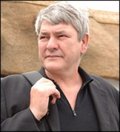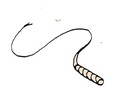I just read a book review, in Saturday's enjoyable and infuriating Guardian Review, which throws some interesting light on what's wrong with the modern literary novel, and with modern literary criticism, and with the modern literary ghetto. (A ghetto that doesn't know it's a ghetto: a ghetto that thinks it is the world.)
The review is by Kamila Shamsie (author of Broken Verses, a literary novel, published by Bloomsbury). It is of The Opposite House, by Helen Oyeyemi (also a literary novel, also published by Bloomsbury... but that incestuous connection isn't the main problem, thought it does reveal a lot about the tiny size of the British literary pond).
This is the first line of the review: "The Opposite House is not the first novel to suggest that migration is a condition, not an event; but it may be the first to contend that the condition afflicts no one so profoundly as the gods."
Now, I couldn't quite believe that was her opening claim. But it was. She really thought that her stablemate at Bloomsbury was probably "the first to contend" that migration "afflicts no one so profoundly as the gods". And editors and sub-editors had let this stand.
Which means that nobody involved in the whole process was aware that Neil Gaiman had spent nearly six hundred pages, in his novel American Gods (which is not "literary", nor published by Bloomsbury), writing about nothing but how migration profoundly afflicts the gods.
Now, American Gods is not an obscure book: It is recent (published in 2001). It was immensely successful (a New York Times bestseller in both hardback and paperback, a best-seller all over the world). It was very, very widely reviewed (my current paperback edition contains four densely-packed pages of rave reviews, which range from the Washington Post through William Gibson to The Independent). And it has won about as many awards as a book can win. It lifted not only both of the biggest science fiction awards (the fan-voted Hugo, and the writer-voted Nebula), but also the main horror award (the Bram Stoker Award), as well as the Locus Award for best fantasy novel. A novel by a British writer, set firmly in modern America, it crossed genre boundaries. It found a huge readership. It could not have made a bigger splash.
But American Gods is not a "literary novel", so it is perfectly acceptable for a literary novelist, reviewing a literary novel which is (among other things) trying to do the same thing as American Gods (but years later, on a much smaller scale), to totally fail to mention it. Not only fail to mention it, but to claim that the idea may well have just been invented by her fellow Bloomsbury novelist.
I don't mean to pick on Kamila Shamsie by pointing this out. The fault is in the literary culture, it's certainly not Shamsie's. Her review is a perfectly honourable and fair-minded review from inside the literary tradition. Anyone that the Guardian was likely to ask to review The Opposite House would have done pretty much the same. And if Kamila Shamsie hadn't boldly said "but it may be the first to contend that the condition afflicts no one so profoundly as the gods," she wouldn't have revealed the limits of her reading (always a brave and dangerous thing for a writer to do). Most current literary reviewers are just as limited in their reading. (And most SF reviewers are also stuck in their ghetto: and most crime reviewers: but they at least know they live in a ghetto, and that what they read is a genre. The problem with the literary novel is that it is becoming a genre again, and doesn't know it...)
I am discussing Kamila Shamsie's single, revealing line in such depth, not because it is unusual, but because it exposes something absolutely typical. Literary novels are reviewed only in terms of other literary novels, by people who do not read outside that ghetto, and who are quite unaware of how tiny a world they inhabit. (Though surely a London-based, literary novelist, published by Bloomsbury, who finds themselves reviewing a London-based, literary novelist, who is published by Bloomsbury, must start to get the vague feeling that their world is shrinking alarmingly.)
If you don't know either book: Helen Oyeyemi's book (set in the modern world), in dealing with a troubled modern woman also deals with the Yoruba gods, including Yemaya, "who", according to the review, "has travelled with her believers to different parts of the world, including Cuba.." One of the most powerful sections in American Gods deals with exactly those Yoruba gods, coming with their believers to the Caribbean islands. But then, Gaiman's American Gods tries to deal with pretty much all the ancient gods, struggling to survive, as belief in them dies, in the modern Americas.
American Gods is an epic attempt by a British writer to write the great American Novel. It isn't perfect (a perfect novel is an oxymoron), but it blows almost everything in the literary pages of the Guardian Review out of the green water and high into the blue sky.
Helen Oyeyemi may well have written a wonderful book, I don't know. Kamila Shamsie may well be a thoughtful reviewer, and a fine literary novelist in her own right, I don't know. But a review of The Opposite House should at least mention American Gods. The contrast would be useful, interesting, revealing. An intimate story, in contrast with an epic. A woman's story, in contrast with a man's. But two books by ambitious writers, dealing with the same idea; displaced gods, struggling to adapt in our modern world. You can't ignore the writer who did it first, just because he wasn't published by Bloomsbury.
A literary culture that can't connect these dots has serious nerve-damage.


